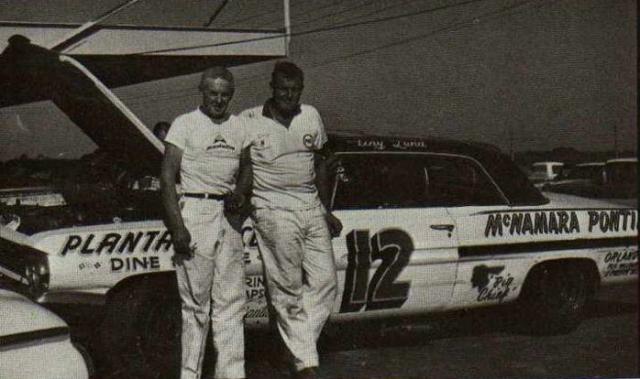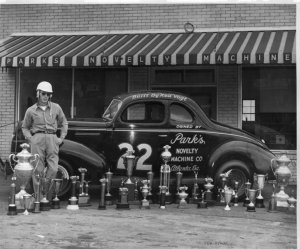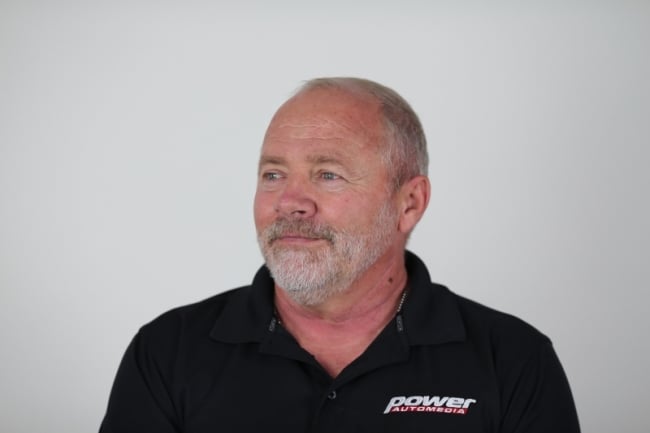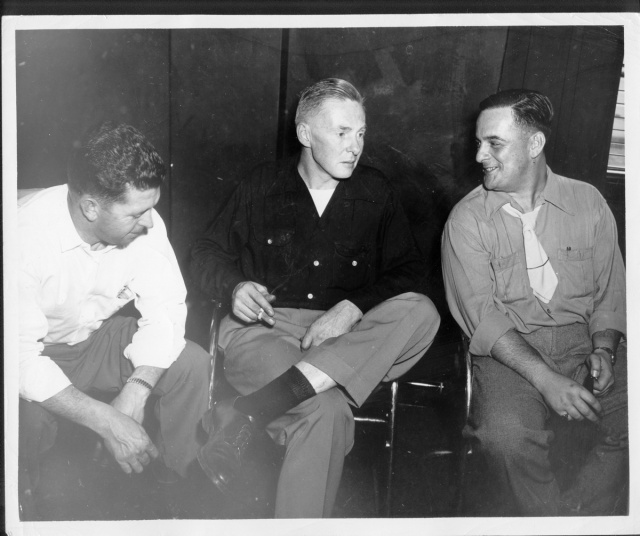It all started with a discussion about who belongs in NASCAR’s Hall of Fame. Since opening in 2010 and inducting the first class of inductees, race fans have debated who belonged in the racing shrine first. The arguments can get heated, especially in the social media sites and message boards where supporters of the drivers debate the issue. Three years later and the debates continue to rage on, perhaps even exacerbated by the miniscule number of inductees each year.
One of these online debates caught our attention. We contacted the source identified in the debate and in short order, we were given a complete history lesson on some of the greatest legends in stock car racing by a man that was there when NASCAR started. We contacted C. Thomas Vogt, son of NASCAR’s legendary mechanic, Louis Jerome “Red” Vogt, and talked to “Little Red”, as he is known to the fraternity of early Nascar racers and fans.
Red Vogt was the Godfather of all stock car racing mechanics. He invented NASCAR and it’s rule interpretations. – Smokey Yunick

Fonty Flock, Red Vogt and Bill France with unknown official in victory lane. Photo from Legends of Nascar.com
As it turns out, NASCAR’s roots are still more of a secret than anything that has hit WikiLeaks. The racing series really owes a debt of gratitude to a convicted bootlegger and a foul-mouthed mechanical genius for their beginning and successful rise to the top of the motorsports world. Raymond Parks, who left home when he was 14 years old, began running moonshine which ended up with Parks serving a nine-month sentence in a federal penitentiary in Chillicothe, Ohio in 1936-1937.
Red Vogt, whose four letter word vocabulary was as extensive as his mechanical genius, is deserving of being in any motorsports Hall of Fame. We could document in several pages why Vogt, the first “super mechanic” in the world of motorsports, is so deserving. Instead of us telling the story second hand, we’ll let his son, Thomas “Little Red” Vogt tell the details firsthand.
C. Thomas “Little Red” Vogt is currently writing a book about his father and the details of his father’s involvement in motorcycle, sprint car, Indianapolis and stock car racing. Our interview only scratches the surface of what Red Vogt was able to accomplish. We look forward to Vogt’s book being published and the details that he was unable to share with us in the limited time we had.
Onedirt: How do you support your claim to be the last living person that was present at the streamline hotel meetings?
Little Red Vogt: This all came to my attention when I read an article in a Charlotte newspaper about a man that had passed away and the paper reported that he was the last living person that was at the meetings at the Streamline hotel for the founding of NASCAR.
When I read that anywhere, my hackles come up because I know that was not the case. That was not the founding of NASCAR. That was not at all the founding of NASCAR. If the truth be known, my dad started the beginnings of NASCAR. I wrote to the gentleman that wrote the article and told him my name and explained that I was there at the streamline hotel and sat in the chair between my father and Ossinsky in the meetings during November and December of 1947 and that I was still alive and here I am. I never heard anything from him or saw any retractions or things like that.
Then six months later I read another story in the Atlanta Journal Constitution, a gentleman published a story saying that so-and-so had passed away and was a bootlegger that had bought stock in the open board meeting at the founding of NASCAR and he was the last surviving member la-dee-dottie-da… so I picked up the phone and I called that fellow. I told him that I was C. Thomas Vogt, otherwise known as Little Red, etcetera, etcetera, etcetera and the first thing he said was “the first thing I want you to do is prove it.”

Red Vogt and Red Byron made up the first "super team" of mechanic and driver in NASCAR history. Photo from Legends of Nascar.com
I told him that I wasn’t going to go into a lot of detail but I would send him a copy of my birth certificate and that he could go from there if he wanted to but that was his job to research that out, It wasn’t my job to prove that out. I mailed him a copy of my birth certificate and I never heard another word.
OD: Little Red, you’ve claimed that your father was the real founder of NASCAR. How do you support that claim?
LR: Before I say anything, let me make something perfectly clear. My father, Louis Jerome “Red” Vogt, could never have done what Bill France did in building NASCAR. He could never have done that. My father was not capable of that. He didn’t have that kind of knowledge. He didn’t have that kind of personality. Frankly he just didn’t have the interest. So Bill France, in his own right, with his particular personality, was capable of doing it, and he did it. I give him all the credit in the world for being able to do what he did. I don’t want anyone to ever think that I don’t give Bill France credit for what he did because he did do some amazing things.
When I was sitting at the table in Daytona Beach, I was 13 years old. Just a kid, but I was a student at the Georgia Military Academy, one of the finest preparatory schools in the country at the time. I was enrolled there and had been going since I was 4 years old. So I was pretty well educated and I knew what was going on. Nobody had to draw me a picture.

Raymond Parks, race team owner and bankroll behind the origin of NASCAR. (Photo from C. Thomas Vogt)
Point of fact is that I am very proud that I was there and sat beside my dad at that time. I can’t say that I was proud to sit next to Bill France because I knew who Bill France was and I know how he did what he did. I know who was behind what he was able to do. I know that sitting at that table on those days in Daytona Beach, Florida, Bill France was essentially flat broke. He didn’t have any money.
Raymond Parks was the person that bankrolled Bill France. There’s no question about that. There’s absolutely no question about that. Bill France was not able to do the things he did, he wouldn’t have even been able to go to the local hamburger stand and buy a hamburger, if it had not been for Raymond Parks.
Once Bill France, through his attorney Ossinsky, gained control of the initial stock of NASCAR, then he did things by leaps and bounds with a lot of money from Raymond Parks. A lot of money from Raymond Parks. And other sources. Once people saw what was going to be happening, then money came from a lot of other sources than Parks. Without Raymond Parks, my dad’s idea would have never gotten off of first base. Because Raymond Parks was the money behind my dad’s idea. He financed the whole operation. He financed Bill France.
OD: It sounds like Raymond Parks and Bill France were instrumental in founding NASCAR. How was this your father’s idea?
LR: The beginnings of NASCAR is a convoluted story, if you will. It really actually began in 1929. My dad organized and eventually chartered a racing series in Georgia called the National Stock Car Racing Association, and that is where the concept began.
My dad is credited with coming up with the name NASCAR. That’s been recognized. Write down the National Stock Car Racing Association (NSCRA), then write down National Association for Stock Car Auto Racing (NASCAR). They’re basically the same thing just switching around the words. What happened was when they were sitting around the table in Daytona Beach, Ossinsky said that we couldn’t use the title NSCRA because it had already been chartered and incorporated in Georgia. They discovered that dad owned the charter to the NSCRA. Oh, and by the way, he also owned the charter to NASCAR, which is not something widely known. He owned the NASCAR charter in Georgia. He gave up both of those charters in Georgia to allow those things that took place in Florida to happen.
I’ve been so crushed all the years that dad somehow got pushed to the side and never got the credit that he deserved. I have a theory about it, and I don’t know if it’s true and it’s certainly not complementary, I just don’t think that the France Family wants anybody to challenge the myth that Bill France founded NASCAR. I don’t think they want that challenged in any way.

Anyone that wanted to go fast sought out Red Vogt. Here Tiny Lund is pictured with the Godfather of Stock Cars. (Photo from C. Thomas Vogt)
They’ve been able to successful suppress dad’s appearance anywhere. Bill France gained control of NASCAR by getting ahold of all of the stock. He got financial control of NASCAR. The France Family owns and controls all the stock in ISC, owns and controls all the stock in NASCAR, the France family owns the whole kit and kabootle. All that is fine, my issue is simply that Bill France did not found NASCAR. That’s my issue. I want my father to be recognized for having the concept, the idea, born in 1929 as the NSCRA which was reorganized into NASCAR.
OD: So your father was tabbed by Raymond Parks to build some fast engines for his moonshine runner’s cars?
LR: That’s right. But remember, dad had already been building Indianapolis engines, he was a riding mechanic at Indianapolis. He built a lot of Miller engines for Indianapolis cars. That goes back a few years, the Miller pre-Offenhauser engines. He built engines and served as a riding mechanic for Peter DePaolo. Years later, DePaolo started a NASCAR team with Ford and he got dad to build the engines and cars. Dad was the chief honcho for the program.
OD: Did your father work on any car or was he specialized?
LR: Well, Dad was a Ford man. He was a dyed in the wool Ford man. But his basic principal was “Where is the money?” “You want to go fast? Where’s the Money?” How fast you want to go depends on how much money you had. That was his basic theory. Dad would build you whatever kind of engine you wanted as long as you had the money. It didn’t matter what it was, Cadillac, Oldsmobile, Chevrolet, it didn’t matter but his expertise was in Ford engines.
Henry Ford came down to Atlanta early in Dad’s career, when he first got down there. Dad got to Atlanta in 1929, and I’m not sure what year Ford came down. My Mother told me this story, my Dad confirmed it but he isn’t the one who told me the story. Henry Ford came down to Atlanta with two of his engineers, and they wanted my father to show them and explain to them how he was gaining extra horsepower out of the ’32 Ford V8 engine. Then they came down later and wanted to know how Dad was getting more horsepower out of the first 85 horsepower engine.
Dad, being the man he was, would help anybody that wanted and asked for his help. He would help them. Dad was a product of German immigrants which he felt gave him the ability to do what he was able to do. He felt that German engineers were the finest in the world. He was willing to take the criticism during WWII for believing that. People came down very heavy on him for that. Getting back to Henry Ford, do you realize how much money dad could have made off teaching the Ford engineers that stuff?

Vogt's work was showcased in NASCAR by winning the first two NASCAR Championships with Red Byron. Photo from Legends of Nascar.com
One of the benefits that dad got from his cooperation with Ford and DePaolo and that whole thing was that Ford produced special engine blocks for dad that were somewhat larger than the stock engine blocks. You could sit them side by side and tell the difference but if you looked at them in the car, or if you just took the motor and tore it down to the block, you couldn’t tell the difference between the special blocks and the regular engine blocks, unless you put them side by side.
The reason they were larger was the water jackets had more space, the cylinder walls were thicker so that they could be bored out to what dad wanted to have. Dad could do a lot of things with a hand grinder. He didn’t use anything special other than his eyes and his hands to grind out and open up the orifices to the point where he wanted them to be. He used his fingers as measuring devices. He didn’t use calipers or anything like that, he just stuck his fingers down in there and feel the metal. I don’t know how many times I watched him do it. Dad was quite talented at opening up the airways, the oil passages and the water jackets and such.
Thanks Red. You were One Hell of a Racer. Somehow, someday you will gain the recognition you so richly deserve and no one will keep you from that. – Smokey Yunick
LR: Dad was taken advantage of by a lot of people. Especially, and this is what I’m leading up to, he was taken advantage of by a lot of people including his childhood best friend, Bill France. They grew up together in Washington, D.C. as childhood friends.
Let me tell you how this played out. Bill France’s wife, Ann France, called my mother in Atlanta in 1934, telling her that Bill had been out of work for over a year and a half, almost two years. This was the worst year of the great depression. Ann said that they were totally broke and didn’t know what to do. Ann and my mom were very good friends. Mom was born in Silver Springs, Maryland, right outside Washington, D.C. My mother knew Bill France and she knew Annie before my family moved to Atlanta.
So my mother knew who Bill France was and she didn’t trust the man because he was not really a trustworthy person. But my father liked the man because he had been very good friends with him. Bill France, as my mother explained it, was a “hanger-on” guy. He didn’t have any of the skills my father had. He couldn’t do what my father could do.
————————–
The Next Step
Dr. C. Thomas “Little Red” Vogt is currently writing a book on his father’s amazing life, and we are pleased that he shared with us some of the details of NASCAR’s formation as he recalls them. Little Red is probably the last person alive with intimate details of those early “Streamline Hotel” days, but from hearing his stories, and stories from the children of the other NASCAR pioneers from that time, the complete history of NASCAR’s early days has not been told. We think “Little Red” Vogt’s book will shed a lot of light on those times. We also know that the book will be about a son that admired, looked up to and loved his father. Not looking for financial gain, Vogt is simply pursuing this endeavor to get the credit that he feels his father is due, even if it is posthumously.




















